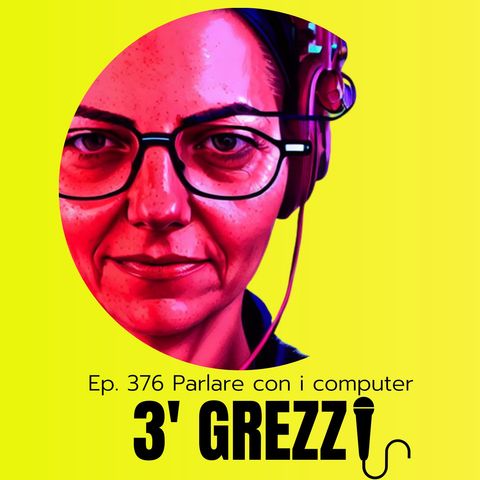3' grezzi Ep. 376 Parlare con i computer

Descarga y escucha en cualquier lugar
Descarga tus episodios favoritos y disfrútalos, ¡dondequiera que estés! Regístrate o inicia sesión ahora para acceder a la escucha sin conexión.
Descripción
Mestieri del futuro non hanno ancora nemmeno un nome, molti di questi hanno a che vedere con la tecnologia. TRASCRIZIONE CON LINK (English translation below) I mestieri scompaiono sempre. Solo...
mostra másTRASCRIZIONE CON LINK (English translation below)
I mestieri scompaiono sempre. Solo che quando ci si trova nel periodo in cui stanno scomparendo i mestieri che facevano le nostre mamme e i nostri papà, si rimane un attimo titubanti e molti dei mestieri che i nostri genitori facevano, e a noi sembravano del tutto normali come autista di autobus, presto non ci saranno più, verranno sostituiti da altri mestieri.
Per molti di questi mestieri del futuro ancora non esiste nemmeno un nome. Infatti, dieci anni fa nessuno si sarebbe sognato di voler fare da grande l'ideatore di istruzioni per intelligenza artificiale generativa. Che cos'è? È creare delle stringhe di domande e delle descrizioni, no, più che delle descrizioni, appunto delle istruzioni da dare in pasto ai computer che elaborano intelligenza artificiale.
Se fino a poco tempo fa questo era un compito riservato a persone che avevano studiato ingegneria elettronica, linguistica applicata eccetera, ora lo può fare chiunque, dal computer di casa propria, addirittura dal cellulare, usando GPT-3 ad esempio, che è un interfaccia che si può usare senza conoscere il linguaggio macchina, quindi senza aver mai fatto coding, semplicemente si fanno delle domande, possono essere delle domande fatte usando il linguaggio naturale come noi parliamo.
Io ho provato a usarlo diverse volte e ogni volta rimango basita, anzitutto dalla velocità con cui le risposte vengono date, poi dalla completezza e anche dalla lunghezza delle risposte. Ho chiesto cose tipo "qual è la situazione del podcast in Italia?" e ha fatto un'analisi veramente intelligente e che risponde effettivamente a quello che è anche la mia esperienza.
Però non è semplice farsi dare cose intelligenti o comunque che non suonino come qualcosa di copiato e di visto e di rivisto dai computer che usano l'intelligenza artificiale generativa. C'è tutta una tecnica che appunto adesso viene insegnata in questi corsi dove si apprende, che poi sono praticamente modi di giornalismo, un po' quello che... Com'e come certi giornalisti riescono sempre a fare delle interviste interessanti anche quando intervistano una pietra, invece altre persone, anche quando intervistano una persona incredibilmente brillante, vengono fuori con delle cose piatte. Ecco, si tratta sempre di sapere come porre le domande.
Comunque, se vi interessa un mestiere del futuro, il creatore di istruzioni per l'intelligenza artificiale generativa è sicuramente uno di quelli che farà parlare di sé nel prossimo futuro.
TRANSLATION
Jobs always disappear. Except that when we find ourselves in the period in which our mums and dads' jobs are disappearing, we remain hesitant for a moment and many of the jobs that our parents did, that seemed completely normal to us, such as bus driver, soon they will no longer exist, they will be replaced by other professions.
For many of these professions of the future, there is not even a name yet. In fact, ten years ago no one would have dreamed of wanting to grow up as a creator of instructions for generative artificial intelligence. What is that? It means creating strings of questions and descriptions, no, more than descriptions, precisely instructions to be fed to the computers that process artificial intelligence.
If until recently this was a task reserved for people who had studied electronic engineering, applied linguistics, etc., now anyone can do it, from their own home computer, even from a mobile phone, using GPT-3 for example, which is an interface that you can use without knowing machine language, so without ever having done coding, you simply ask questions, it can be questions asked using natural language as we speak.
I have tried to use it several times and every time I am amazed, first by the speed with which the answers are given, then by the completeness and also by the length of the answers. I asked things like "what is the situation of the podcast in Italy?" and it made a really intelligent analysis and that actually responds to what is also my experience.
But it's not easy to get things that are intelligent or anything that doesn't sound like something copied, already seen many times, by computers that use generative artificial intelligence. There is a whole technique that is now being taught in these courses where one learns, which are practically the ways of journalism, a bit like that... You know, how certain journalists always manage to make interesting interviews even when they do interviews a stone, on the other hand other people, even when they interview an incredibly brilliant person, they come up with some flat stuff. Well, it's always about knowing how to ask questions.
However, if you are interested in a profession of the future, the creator of instructions for generative artificial intelligence is certainly one that will be talked about in the near future.
Información
| Autor | M. Cristina Marras |
| Organización | M. Cristina Marras |
| Página web | - |
| Etiquetas |
Copyright 2024 - Spreaker Inc. an iHeartMedia Company

Comentarios